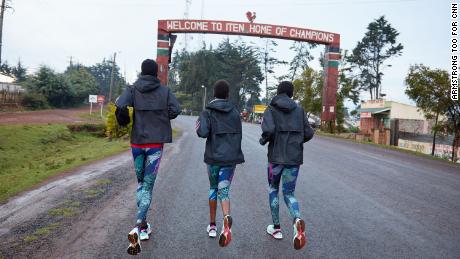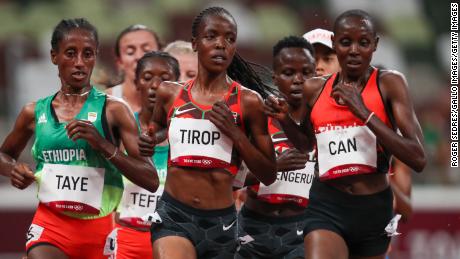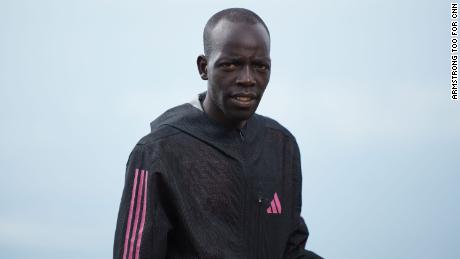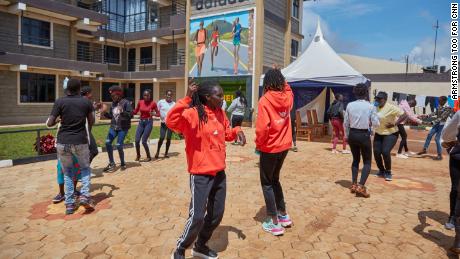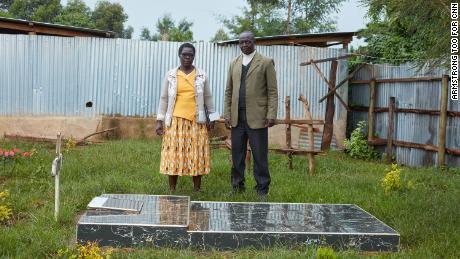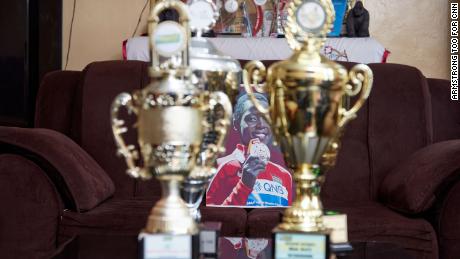Femicide in Kenya: Deaths of elite athletes cast spotlight on domestic violence
Updated 1453 GMT (2253 HKT) February 5, 2024
This story is part of As Equals, CNN's ongoing series on gender inequality. Find out more about it here.
Iten, Kenya (CNN)Martin Tirop pumps his fists in the air as Faith KipyegonŌĆ»wins her third 1,500-meter gold medal at the World Athletics Championships on Tuesday in Budapest. It is a bittersweet moment for him as Kipyegon invariably reminds him of his slain sister, Agnes.
ŌĆ»Agnes Tirop ran with theŌĆ»superstarŌĆ»in their junior years, when both women were scraggly teens making their mark in Kenyan competitive circles, he tells CNN. "Watching her run and win is likeŌĆ»watching my sister. I go through a mixture of feelings: pride, sadness ... I wish Agnes was still here, she'd be in Budapest too, competing."
Instead, on October 13, 2021, Martin Tirop made a gruesome discovery inside his sister's three-bedroom bungalow in Kenya's capital of distance running. Agnes had just returned from a race in Switzerland, but Martin says he couldn't reach her for days.
After alerting the police, he tells CNN that he went to her house and peeked through a window to see her body slumped in a pool of blood near her bedroom door.
She had stab wounds in her neck and was wearing her Adidas sports bra and shorts. Martin believes she was probably headed out for a run when she was attacked.
In the world of elite running, Agnes had been a rising star. She broke the women's 10km record in Germany in September 2021, about a month after placing fourth in the 5,000 meters at the Tokyo Olympics. She lived and trained in Iten, where, as Martin recalls, fans would wave excitedly when she drove by in her white Toyota pickup, blaring gospel music.
Shocked neighbors gathered outside the home and wept as the 25-year-old champion was led away on a gurney.
Then six months later, nearly 2 kilometers away from her house, tragedy struck again.
Another runner, Damaris Mutua, was found strangled in a home with a pillow over her face. Mutua had just placed third at a half marathon in Angola earlier that month. She was a bronze medalist at the 2010 Singapore Youth Olympics.
Investigators declared Tirop's husband a suspect. And in Mutua's killing, the main suspect was her boyfriend.
Iten, an idyllic town perched almost 2,400 meters (about 8,000 feet) above sea level and a revered training ground for long-distance runners, was now making global headlines for the brutal killings of two women athletes, allegedly at the hands of their intimate partners.
The deaths cast a spotlight on violence that is often unnamed and unaddressed. "We realized that female athletes are suffering, and they're silent," says Joan Chelimo, a long-distance runner who trains in Iten. "They needed to know they're not alone, and they have rights, too."
A small remote town grapples with a global problem
Iten sits on the western edge of Kenya, six hours from the capital city of Nairobi. It's a scenic blend of red soil, corn fields and homes scattered across the mountainous countryside. But it's Iten's high altitude, crisp air and rural simplicity that has drawn long-distance runners to its numerous running camps since the 1960s.
Eliud Kipchoge, the first man to run a marathon in under two hours, has trained here. So has Faith Kipyegon, the current 1,500m record holder and winner of the same race at this week's World Athletics Championships. Too famous to run Iten's hills uninterrupted, both Kipchoge and Kipyegon now train at a camp in Kaptagat, about 30 miles away from Iten.
Signs of the town's greatest export are everywhere. In the hazy dawn light, before most of the town wakes up, groups of runners dash past a red metallic square arch emblazoned in white upper-case letters: "Welcome to Iten, home of champions." The sound of feet pounding gravel roads is punctuated only by crowing roosters and chirping birds.
The goal here, local runners tell CNN, is to get brand sponsorships, which come with stipends, performance bonuses and sometimes paid travel expenses for races -- resources that allow them to participate in international competitions. They dream of bringing home the kind of competition wins that can completely change a life in this part of the world. Prize money in the Boston Marathon, for example, is $150,000 for first place, while the New York City Marathon's top winners got $100,000 last year. By contrast, Kenya's gross national income per capita (the country's total income divided by its population) in 2022 was $2,170.
Most mornings, Agnes and her brother, in matching lime green tights and black T shirts, would lace up their sneakers and join other runners. The young woman's success had begun to transform her family's fortunes. "Agnes had made it and was lifting our family out of poverty," Martin tells CNN. "My parents had lived in a grass-thatched house all their lives until she bought them land and built them a brick house. She'd brought us so much hope."
These days, Martin runs long stretches of the training route alone. He describes his anguish and rage at Agnes' killing: "I miss running with her," he says. "That man took everything from our family. Not just our sister, even our hopes and our dreams. I want him in prison forever."
In Kenya, according to government data from 2022, more than a quarter of men, and a third of women aged 15 to 49 have experienced physical violence, "committed by a husband/wife, intimate partner or anyone else." Not only do more women experience violence, as the survey points out, "marital status is linked to experiences of violence among women ... women who have ever been married are much more likely to have experienced violence since age 15 than those who have never been married (41% versus 20%)."
While the official data shows prevalence of intimate partner violence, experts tell CNN that the true number of cases is probably higher than reported as many victims suffer in silence. "A majority of the attacks don't get reported because people don't have faith in the system," says Irungu Houghton, executive director for Amnesty International Kenya. "They feel that the police may not be humane, that they may ridicule them, that the judicial process may take too long."
Domestic violence is not limited to Kenya alone. A review of all the available data from 2000 to 2018, which covers 90% of women and girls ages 15 and over in 161 countries and areas, found that 27% of partnered women have experienced intimate partner violence.
In the United States, "1 in 4 women have experienced severe intimate partner violence," according to the National Coalition Against Domestic Violence. Advocacy groups have described the murder of US women, "predominantly killed by men they know, and largely by current or former intimate partners," as "a silent epidemic."
The deaths of Tirop and Mutua are proof that even successful female athletes cannot escape violence.
'We don't protect them. We just expect them to break records'
Experts and runners alike tell CNN that in Iten, a mix of (potential) wealth, fame and a patriarchal culture -- where a man is expected to be the breadwinner -- leaves young ambitious women either prey to unscrupulous men trying to get their hands on their future earnings, or vulnerable to intimate partners who wish to control them.
At a gathering of athletes in Iten, half a dozen women shared stories with CNN of alleged physical, emotional or financial abuse at the hands of an intimate partner. One woman said she had to hand over all her prize money to her husband so he could maintain his image as the family breadwinner.
Reflecting on the precarious position that some female runners find themselves in, Njeri Migwi, founder of Usikimye, an organization that provides refuge to victims of sexual and gender-based violence across Kenya, tells CNN: "The minute they want certain levels of independence, the men abuse them. We [society] don't protect them ... we don't even give them training [to advocate for themselves] ... we just expect them to run and break records. Where is the outrage? Where is the anger?"
Echoing Migwi's words, runner Joan Chelimo tells CNN that young up-and-coming runners "are easy targets because they are new, they don't know much, they have no financial advisers. Some of them are being given something as simple as shoes or being offered connections to agents, and then they feel responsible to give everything to this man, to be submissive to the man."
These views are certainly supported by Martin Tirop's account of his sister's life.
Agnes, he says, had begun dating her husband, Ibrahim Rotich, when she was still in high school. He was 16 years older, and Martin says he isolated Agnes from her friends and family. In fact, their March 2016 marriage had been a secret, with Agnes' family only finding out after her death at 25.
Martin alleges that Rotich had been abusive, and Agnes had left him, moving to a training camp for runners shortly before she was killed. He says they later found out from a friend that Agnes had briefly returned to the home she once shared with her husband.
A day after Agnes' body was found, Rotich was arrested 800km away in the coastal city of Mombasa. He was allegedly trying to flee the country, the Kenyan Directorate of Criminal Investigations said at the time.
Rotich pleaded not guilty to murder, although he admitted to killing Tirop in an affidavit requesting bail, according to court documents and Tirop's family attorney, Richard Warigi. His request for a plea deal on a lesser charge of manslaughter was denied, the lawyer adds.
Ibrahim Rotich is being held without bail on a murder charge and his trial begins in November. His attorney, Ngigi Mbugua, declined to comment.
Mutua, who held both Kenyan and Bahraini nationality, was 28 when she was killed. The man suspected of the crime, her Ethiopian boyfriend, has not been arrested. Investigators told local media last year that he left for neighboring Ethiopia after the killing.
CNN reached out to the Directorate of Criminal Investigations for more information but has not heard back. Equally, CNN's attempts to reach Mutua's family were also unsuccessful.
Investigators have not disclosed the alleged motives behind the killings of each woman. But Houghton of Amnesty International is categorical about what he sees as the root cause of domestic violence in Kenya, more broadly: "The major driver of sexual and gender-based violence is patriarchy," he tells CNN.
"The idea is that men have an entitlement to women's bodies, that they should always be in control, that they should have more resources and finances and income. And of course, [this] is not the reality in the real world anymore."
'Don't be quiet when anyone harms you'
On a sunny Saturday in late June, three dozen women meet in the courtyard of their fellow athlete, Joan Chelimo's guesthouse. They dance, hug, huddle in groups and eat plates of rice and chicken. Some share their experiences of abuse and how they quietly planned their exits while their spouses were away.
The event is organized by Tirop's Angels, a nonprofit group started in early 2022 by athletes and Agnes Tirop's family, which states among its objectives: Empowering women and girls at risk of violence, expanding services available to survivors, intensifying efforts to turn policy pledges into reality and engaging men and boys, traditional and faith leaders in prevention efforts.
Chelimo is one of the group's five co-founders. "We started Tirop's Angels out of emotions, we were heartbroken," she says. "Agnes lived here [in Iten], she was one of us, and we didn't even know what she was going through."
But the first reaction to this new group, hoping to start a public conversation about what has been happening privately, was suspicion and distrust.
"It was very hard for people to understand what we were doing," Chelimo admits. "Most of the men thought that we are against marriage. And here, most things are cultural: if I go to my mother or to my girlfriends, they'll tell me to fight for my marriage even if it's abusive. Trying to change that mindset is not easy."
"Now, girls are coming to us and speaking up," Chelimo adds. "That's a big achievement because, like Agnes, a lot of them could not talk about their issues."
The organization brings in experts to help young runners live more rounded lives, providing them with information on subjects from financial literacy to investments and relationship red flags. "We want to make sure the women are financially independent so that in case someone wants to leave, they don't feel like they are holding on to their partners due to what they have," Chelimo tells CNN. "It's hard work ... because we're dealing with so many issues here that are interconnected."
The group realizes that a major cultural shift is needed and says it's working with local schools to educate children on forms of abuse, to ensure future generations of runners learn crucial lessons at a young age.
The loss of her daughter has also made an advocate out of Dinah Tirop. "Every chance I get, I tell young girls, even my other daughters, 'Be careful who you date. Don't let anyone lie to you, don't be quiet when anyone harms you,'" she says in a whisper.
Agnes' trophies, medals and ribbons are neatly arranged on a table in the corner of her parents' living room, a monument to a daughter whose big dreams came true. Dinah takes the Tokyo Olympic ribbon from the table, places it around her neck and gently runs her hand over it. Her eyes well up. Not knowing what her daughter was going through still haunts her to this day.
A grave is visible through the open door, its dark granite glistening after a heavy downpour.
"Agnes Tirop. Loved beyond words," the cross reads.
If you, or someone you know, has experienced or might be at risk of domestic violence, here are ways to help:
In the US: National Domestic Violence Hotline Call 1-800-799-7233 or text LOVEIS to 22522. Available 24/7. Also available through online chat tool.
Getting help around the world: A worldwide list of directories is provided by UN Women. You can also find a list of national agencies on The Pixel Project.
